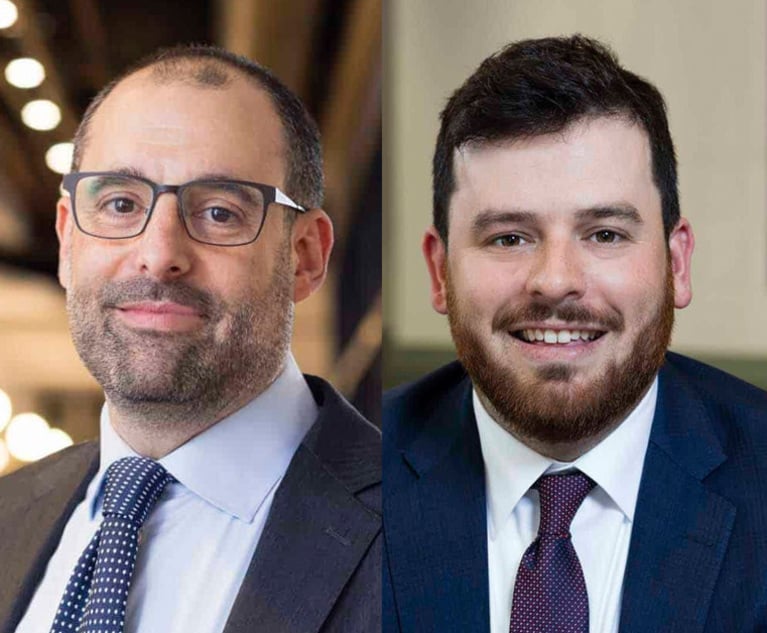 Alan Nochumson.
Alan Nochumson.Dramatic Changes to Phila. Residential Property Taxes Likely
By the end of this year, Philadelphia City Council, with the approval of Mayor Jim Kenney, will likely pass into law dramatic changes as to how some residential properties within city limits will be taxed.
December 09, 2019 at 01:18 PM
7 minute read
By the end of this year, Philadelphia City Council, with the approval of Mayor Jim Kenney, will likely pass into law dramatic changes as to how some residential properties within city limits will be taxed.
On an annual basis, all real estate located in Philadelphia is assessed by the city of Philadelphia's Office of Property Assessment separately based upon the then-fair market value of the land, as well as the then-fair market value of the building structure, if any, situated on the land.
For purposes of this article, I will assume there is a property existing in Philadelphia with an address of 123 Main St. and that the property's fair market value for the land is $100,000 and for the building structure is $400,000, meaning that the property's combined fair market value for real estate tax purposes is $500,000.
Based upon the current tax rate, $1,400 of real estate taxes is due for every $100,000 in a property's assessed value, unless a portion of the property's assessed value is exempt from taxation.
In other words, the property owner of 123 Main St. would pay $7,000 in real estate taxes under this scenario, without taking into account any tax exemptions under the law.
|Real Estate Tax Abatement Program
Since 2000, if a property owner develops vacant land in the city of Philadelphia by building a newly constructed home, the city government has offered a real estate tax abatement for a period of 10 years for the increase in the property's assessed value based upon the improvements made to the property.
Simply stated, during this 10-year period of time, the owner of the property will not pay any real estate taxes based upon the then fair market value of the building structure situated on the property.
This portion of the real estate tax abatement program is commonly known as Ordinance 1456-A and is codified under Section 19-1303(4) of the Philadelphia Code.
Under the current version of the law, based upon my example, if the building structure on 123 Main St. is newly constructed on what was formerly vacant land, the property owner would pay $1,400 for the assessed value of $100,000 for the vacant land, but would not currently be liable to pay the $5,600 in real estate taxes which would otherwise be due based upon the assessed value of $400,000 for the building structure. Assuming the fair market value (and, thus, assessed value) for the land and building structure remains the same for the 10 years of the tax abatement, under the current tax rate, the property owner would save $56,000 in real estate taxes due to the current version of this portion of the real estate tax abatement program.
For a variety of reasons, this year, Philadelphia City Council has advanced Bill No. 190013 that would alter how much of the assessed value of a newly constructed home would be exempt from taxation during this 10-year period of time.
Under Bill No. 190013, which is expected by the end of the year to be passed by Philadelphia City Council and signed into law by Kenney, during this 10-year period of time, the assessable amount of the applicable building structure for residential properties shall be exempt from real estate taxation, as follows: 100% of the assessable amount of the building structure in the first year; 90% of the assessable amount of the building structure in the second year; 80% of the assessable amount of the building structure in the third year; 70% of the assessable amount of the building structure in the fourth year; 60% of the assessable amount of the building structure in the fifth year; 50% of the assessable amount of the building structure in the sixth year; 40% of the assessable amount of the building structure in the seventh year; 30% of the assessable amount of the building structure in the eighth year; 20% of the assessable amount of the building structure in the ninth year; and 10% of the assessable amount of the building structure in the 10th and final year.
In other words, under what is expected to be the new version of this portion of the real estate tax abatement program, the property owner will not save $56,000 in real estate taxes, as they would under the current version of the law, but rather $30,800. This reduction in real estate tax savings will be 55% as compared to the current version of this portion of the real estate tax abatement program.
Although Philadelphia City Council originally proposed for the new version of this portion of the real estate tax abatement program to take effect on July 1, 2020, through a compromise with Kenney, it has agreed to make this change in the law effective as of Jan. 1, 2021.
The extended effective date will give real estate developers and investors potentially the time necessary to complete projects which are already in the pipeline and actually may cause them next year to develop additional newly constructed homes on vacant lots as, after Jan. 1, 2021, home buyers will likely ask for price concessions to account for the lesser tax abatement under the new law.
Of particular note is that for the time being, there will not be any changes enacted to the other portions of the real estate tax abatement program.
Under Ordinance 961 (which is codified under Section 19-303(2) of the Philadelphia Code), the city of Philadelphia will still offer a real estate tax abatement, without restrictions, on improvements made to existing residential building structures that will either be sold at the completion of the improvements or occupied by the property owner. Structures that contain one or more dwelling units are eligible for a tax abatement under Ordinance 961.
Under Ordinance 1130 (which is codified under Section 19-1303(3) of the Philadelphia Code), property owners will still be allowed, without restrictions, to obtain a real estate tax abatement for improvements due to rehabilitation of a preexisting building structure or new construction of commercial, industrial and any other business properties.
While Philadelphia City Council has elected this year not to address these other portions of the real estate tax abatement program, that does not mean further changes are not on the horizon. Next year, the composition of Philadelphia City Council will be more liberal and some of its newly elected members campaigned on reducing and possibly eliminating the real estate tax abatement program altogether.
|Homestead Exemption
|If you own property in Philadelphia and it is your primary residence, you are eligible for the homestead exemption on a portion of the assessed value of your property.
From the 2014 through the 2018 tax year, the homestead exemption was $30,000. This current tax year, the homestead exemption is $40,000 and for the 2020 tax year the homestead exemption will be $45,000.
Under Bill No. 190943, Philadelphia City Council has proposed for the homestead exemption for the 2021 tax year to increase to $50,000.
In other words, the real estate tax savings will be $700 that a property owner would have paid in real estate tax but for the existence of the homestead exemption.
Alan Nochumson is the sole shareholder of Nochumson P.C., where his law firm's primary practice areas consist of real estate, litigation, land use and zoning, business formation and general counseling and appellate advocacy. He is also president of Bear Abstract Services, where his title insurance company offers comprehensive title insurance, title examination and closing services. He can be reached at 215-399-1346 or [email protected].
This content has been archived. It is available through our partners, LexisNexis® and Bloomberg Law.
To view this content, please continue to their sites.
Not a Lexis Subscriber?
Subscribe Now
Not a Bloomberg Law Subscriber?
Subscribe Now
NOT FOR REPRINT
© 2024 ALM Global, LLC, All Rights Reserved. Request academic re-use from www.copyright.com. All other uses, submit a request to [email protected]. For more information visit Asset & Logo Licensing.
You Might Like
View All

Act 135 Conservator Appointment for Vacant Property Upheld by Superior Court
7 minute read
Disbarred Ex-Blank Rome Attorney Accused of Forging Judicial Signatures
6 minute read
Trending Stories
- 1The Unraveling of Sean Combs: How Legislation from the #MeToo Movement Brought Diddy Down
- 2Publication of Information Regarding Client Matters
- 3The State of Cost Recovery — Post COVID
- 4Why Is It Becoming More Difficult for Businesses to Mandate Arbitration of Employment Disputes?
- 5The Whys and Hows of a Mediator’s Proposal
Who Got The Work
Michael G. Bongiorno, Andrew Scott Dulberg and Elizabeth E. Driscoll from Wilmer Cutler Pickering Hale and Dorr have stepped in to represent Symbotic Inc., an A.I.-enabled technology platform that focuses on increasing supply chain efficiency, and other defendants in a pending shareholder derivative lawsuit. The case, filed Oct. 2 in Massachusetts District Court by the Brown Law Firm on behalf of Stephen Austen, accuses certain officers and directors of misleading investors in regard to Symbotic's potential for margin growth by failing to disclose that the company was not equipped to timely deploy its systems or manage expenses through project delays. The case, assigned to U.S. District Judge Nathaniel M. Gorton, is 1:24-cv-12522, Austen v. Cohen et al.
Who Got The Work
Edmund Polubinski and Marie Killmond of Davis Polk & Wardwell have entered appearances for data platform software development company MongoDB and other defendants in a pending shareholder derivative lawsuit. The action, filed Oct. 7 in New York Southern District Court by the Brown Law Firm, accuses the company's directors and/or officers of falsely expressing confidence in the company’s restructuring of its sales incentive plan and downplaying the severity of decreases in its upfront commitments. The case is 1:24-cv-07594, Roy v. Ittycheria et al.
Who Got The Work
Amy O. Bruchs and Kurt F. Ellison of Michael Best & Friedrich have entered appearances for Epic Systems Corp. in a pending employment discrimination lawsuit. The suit was filed Sept. 7 in Wisconsin Western District Court by Levine Eisberner LLC and Siri & Glimstad on behalf of a project manager who claims that he was wrongfully terminated after applying for a religious exemption to the defendant's COVID-19 vaccine mandate. The case, assigned to U.S. Magistrate Judge Anita Marie Boor, is 3:24-cv-00630, Secker, Nathan v. Epic Systems Corporation.
Who Got The Work
David X. Sullivan, Thomas J. Finn and Gregory A. Hall from McCarter & English have entered appearances for Sunrun Installation Services in a pending civil rights lawsuit. The complaint was filed Sept. 4 in Connecticut District Court by attorney Robert M. Berke on behalf of former employee George Edward Steins, who was arrested and charged with employing an unregistered home improvement salesperson. The complaint alleges that had Sunrun informed the Connecticut Department of Consumer Protection that the plaintiff's employment had ended in 2017 and that he no longer held Sunrun's home improvement contractor license, he would not have been hit with charges, which were dismissed in May 2024. The case, assigned to U.S. District Judge Jeffrey A. Meyer, is 3:24-cv-01423, Steins v. Sunrun, Inc. et al.
Who Got The Work
Greenberg Traurig shareholder Joshua L. Raskin has entered an appearance for boohoo.com UK Ltd. in a pending patent infringement lawsuit. The suit, filed Sept. 3 in Texas Eastern District Court by Rozier Hardt McDonough on behalf of Alto Dynamics, asserts five patents related to an online shopping platform. The case, assigned to U.S. District Judge Rodney Gilstrap, is 2:24-cv-00719, Alto Dynamics, LLC v. boohoo.com UK Limited.
Featured Firms
Law Offices of Gary Martin Hays & Associates, P.C.
(470) 294-1674
Law Offices of Mark E. Salomone
(857) 444-6468
Smith & Hassler
(713) 739-1250





